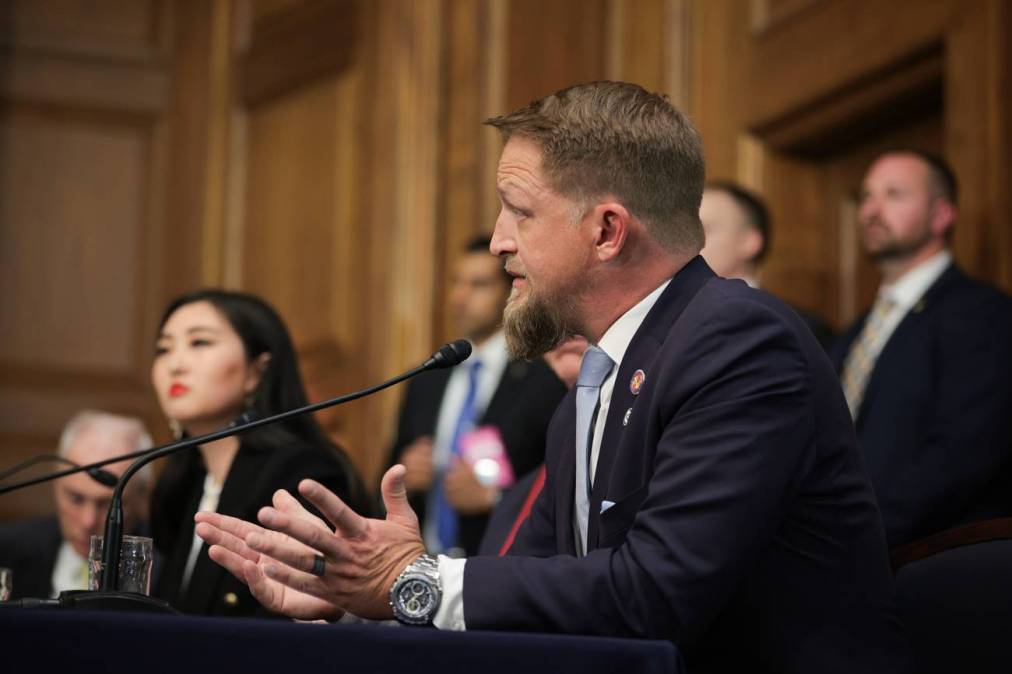State lawmakers push back on federal proposal to limit AI regulation

A bipartisan coalition of more than 260 state legislators from all 50 states on Tuesday sent a letter to Congress opposing a provision in the federal budget reconciliation bill that would impose a 10-year ban on state and local regulation of artificial intelligence.
The lawmakers argue that the decade-long moratorium would hinder their ability to protect residents from AI-related harms, such as deepfake scams, algorithmic discrimination and job displacement.
The outcome of this legislative dispute will likely influence how the AI technology is governed across the United States. The bill is expected to go to the Senate in early June.
Proponents of the contested provision, which the House passed in May, say it aims to prevent a fragmented regulatory landscape that could hamper U.S. tech firms’ global competitiveness, particularly against China. However, state legislators contend that the moratorium would strip them of the ability to address fast-evolving AI threats and protect their constituents.
“As state lawmakers and policymakers, we regularly hear from constituents about the rise of online harms and the impacts of AI on our communities,” the letter reads. “AI will raise some of the most important public policy questions of our time, and it is critical that state policymakers maintain the ability to respond.”
The letter, led by South Carolina Rep. Brandon Guffey, a Republican, and South Dakota Sen. Liz Larson, a Democrat, emphasizes the importance of state autonomy in policymaking. The lawmakers advocate for the ability to enact AI regulations tailored to their communities, especially in the absence of comprehensive federal AI legislation.
“Over the past several years, states across the country have enacted AI-related laws increasing consumer transparency, setting rules for the government acquisition of new technology, protecting patients in our healthcare system, and defending artists and creators,” the letter continues. “The sweeping federal preemption provision in Congress’s reconciliation bill would also overreach to halt a broad array of laws elected officials have already passed to address pressing digital issues.”
State lawmakers are not the only ones who have pushed back against the proposed moratorium. Before the House voted in late May, dozens of state attorneys general sent a letter to Congress, urging members to reject the federal measure, calling it “irresponsible,” “sweeping and wholly destructive.”
The National Association of State Chief Information Officers issued a press release stating it was “concerned” about the language in the proposed bill and its potential impact to the work states have done to regulate AI use.
The Senate’s Bipartisan AI Working Group last year released a roadmap on artificial intelligence, which suggested identifying key areas of consensus across Congress, but it did not lead to any legislation.
California, Colorado and Utah have passed sweeping laws targeting AI’s use in the commercial sector, while many others have narrower laws attempting to govern AI. Another 15 states have proposed similar laws, and many governors have created AI task forces or working groups to propose best practices for AI use.
Rep. Marjorie Taylor-Greene, a far-right Republican from Georgia who has fanned conspiracy theories about everything from 9/11 to Pizzagate, posted on X Tuesday that she is “adamantly” opposed to the provision that would prevent states from enforcing AI laws, though she voted for in favor of the bill. She admitted that neither she nor her staff read the bill fully before she cast her vote.
“Full transparency: I did not know about this section on pages 278-279 of the OBBB that strips states of their right to make laws or regulate AI for 10 years,” Taylor-Greene posted on X. “It is a violation of state rights and I would have voted NO if I had known this was in there.”
The provision’s inclusion in the budget reconciliation bill has also raised procedural concerns. Under the Senate’s Byrd Rule, measures that are not directly related to budgetary issues can be removed from reconciliation bills.
The debate underscores the ongoing tension between federal and state roles in regulating emerging technologies. Some federal lawmakers and industry leaders advocate for a uniform national framework to foster innovation and competitiveness. California Rep. Jay Obernolte, a Republican and co-chair of the Bipartisan Artificial Intelligence Task Force, which issued a report last December, said the proposed moratorium on state AI regulation would be a stopgap measure.
“We have a limited amount of legislative runway to be able to get that problem solved before the states get too far ahead,” Obernolte said during House Energy & Commerce Committee hearing last March.
State legislators meanwhile have stressed the need for localized oversight to address immediate and specific AI-related challenges within their jurisdictions.
“As AI technology develops at a rapid pace, state and local governments are more nimble in their response than Congress and federal agencies,” the state lawmakers’ stated in their letter to Congress. “Legislation that cuts off this democratic dialogue at the state level would freeze policy innovation in developing the best practices for AI governance at a time when experimentation is vital.”






